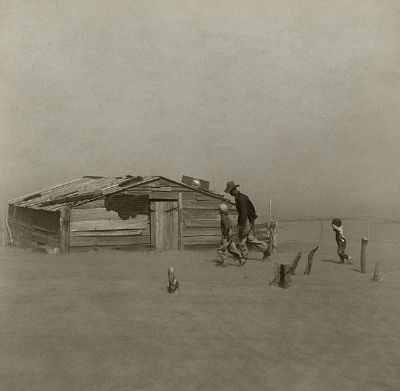
Farmer walking in dust storm, Cimarron County, OK (Wikipedia)
As if conspiring in the family's misery, right about then the Dust Bowl days commenced. Around the boy's 4th birthday, his party was ruined when the plates blew away and the porch where it would have been was covered in red dirt.
Along with drought and poor farming practices that had exposed the topsoil over a huge swath of middle America, the Dust Bowl years were times of great wind storms and outrageously high temperatures for which few had the help of fans, much less air-conditioning. Even in latitudes outside the south, there were often 100°+ days. In Nebraska, for instance, a high of 118° F was recorded in 1934.
 Farmer walking in dust storm, Cimarron County, OK (Wikipedia) |
The biblical plagues continued. Hordes, millions of locusts descended on anything still green or even fibrous. Lacking further crops to consume, they attacked the remaining weeds, grass, even fence posts, eating them to the ground.
The boy's father had no answer for the wind, drought, dust, heat, or locusts, and instead of stopping his wife's abuse of the kids he merely warned them if he noticed she seemed upset and about to launch into one of her rages.
Yet he had some inner resources and cared for his children. He found partners and started a tiny brokerage business, later taking over the firm. When banks left and right were failing so that folks had nowhere safe to put their cash, he began selling door-to-door a few shares at a time of low risk utility companies or municipal bonds. Gradually, his reputation grew, his income increased, and he was able to build the family a brick house in a better part of town.
Following his father's example, and perhaps partly to get out of the house and away from his shrewish mother, at age six the boy had already begun his first business, selling door to door. First it was packs of gum, later magazine subscriptions and bottles of Coca-Cola. Shortly thereafter, he was selling peanuts in the stands at ball games. Thus he obtained the first precious coins, that later would become billions.
When he was ten, the family could finally afford a vacation. His father took him to see one of the kingpins of growing equity power, a man who had worked his way up and, by both talent and perseverance, had become a key partner at Goldman Sachs. On the same trip, the boy's dad showed him the New York Stock Exchange on Wall Street. These experiences made a big impression on the lad.
This boy's father was Howard Buffett. He and his family lived in Omaha, NE. His son, Warren, for over four decades now the CEO of Berkshire Hathaway, always credit's his father for his success. Since Warren Buffett took over that company in the 1960s, its book value has grown at an average rate of just over 20% a year (through 2010). Recently famous as the world's greatest investor, Warren Buffett was a consultant in the 2008 emergency efforts to save our economic system from collapse.
In 2006, he pledged a majority of his net worth, $37.4 billion, to the Bill and Melinda Gates Foundation. He has since been traveling widely, promoting his idea of the rich giving at least half of their fortunes to worthy causes, and indeed he has been getting such commitments from many of his wealthy friends and fellow executives.
We never know in advance what influence we can have on others. Often it may be seemingly small things that have most effect. As I write, it is Father's Day. I am very grateful for the good things my father passed along to me. I applaud too the excellent examples of fatherhood I have observed around me, particularly within my own birth family. Let us all, year 'round, honor the terrific contributions made by our dads.
Primary Source: The Snowball, by Alice Schroeder, 2009 Bantam Books Trade Paperback Edition, Random House, New York.